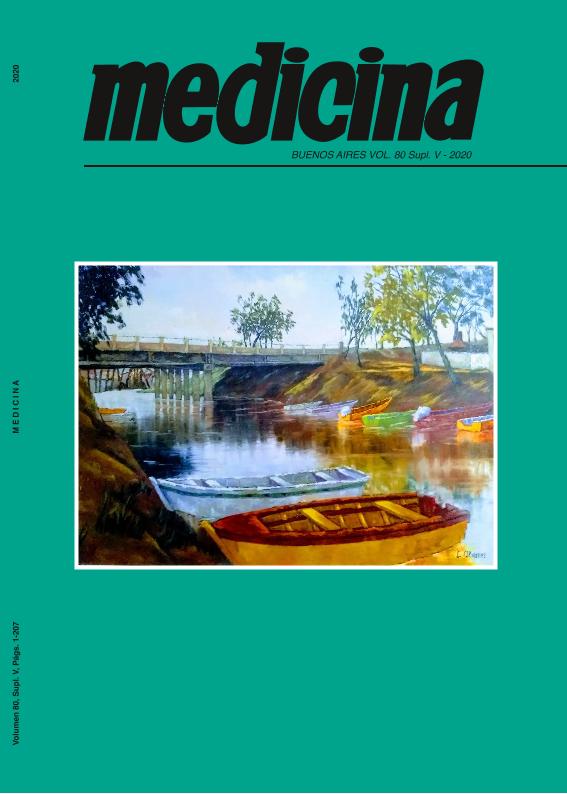Evento
Comprehensive analysis of genetic variants identified by Whole Exome Sequencing in hearing impaired patients in Argentina
Buonfiglio, Paula Inés ; Bruque, Carlos Darío; Lotersztein, Vanesa; Goldschmidt, Ezequiel Darío; Plazas, Paola Viviana
; Bruque, Carlos Darío; Lotersztein, Vanesa; Goldschmidt, Ezequiel Darío; Plazas, Paola Viviana ; Dalamon, Viviana Karina
; Dalamon, Viviana Karina ; Elgoyhen, Ana Belen
; Elgoyhen, Ana Belen
 ; Bruque, Carlos Darío; Lotersztein, Vanesa; Goldschmidt, Ezequiel Darío; Plazas, Paola Viviana
; Bruque, Carlos Darío; Lotersztein, Vanesa; Goldschmidt, Ezequiel Darío; Plazas, Paola Viviana ; Dalamon, Viviana Karina
; Dalamon, Viviana Karina ; Elgoyhen, Ana Belen
; Elgoyhen, Ana Belen
Colaboradores:
Carrillo, Maria Cristina ; Trevani, Analía Silvina
; Trevani, Analía Silvina ; Larocca, Maria Cecilia
; Larocca, Maria Cecilia
 ; Trevani, Analía Silvina
; Trevani, Analía Silvina ; Larocca, Maria Cecilia
; Larocca, Maria Cecilia
Tipo del evento:
Reunión
Nombre del evento:
Reunión Anual de Sociedades de Biociencia 2020; LXV Reunión Anual de la Sociedad Argentina de Investigación Clínica; LXVIII Reunión Anual de la Sociedad Argentina de Inmunología y Reunión Anual de la Sociedad Argentina de Fisiología
Fecha del evento:
10/11/2020
Institución Organizadora:
Sociedad Argentina de Investigación Clínica;
Sociedad Argentina de Inmunología;
Sociedad Argentina de Fisiología;
Título de la revista:
Medicina (Buenos Aires)
Editorial:
Fundación Revista Medicina
ISSN:
0025-7680
e-ISSN:
1669-9106
Idioma:
Inglés
Clasificación temática:
Resumen
Hereditary hearing loss is the most common sensory disorder affecting 1:500 newborn children. It is a heterogeneous disease and more than 100 genes have been related to the pathology. This complexity led us to design a multistep diagnosis strategy with the use of Whole Exome Sequencing Technique (WES). The main objectives were molecular diagnosis of deaf patients and novel genetic variants in-silico and in-vivo analyses.1250 patients were analyzed for frequent mutations in GJB2 and GJB6 genes by Sanger Sequencing genotyping 25% of them according to worldwide reports. From undiagnosed patients, 29 families were selected to perform WES. After filtering and analysis process, 45% of patients were genotyped, identifying 23 causative mutations (11 novel, 12 reported) classified according to ACMG/Hearing Loss-Expert Panel Standards.Some of the novel variants were further studied in silico by structural, stability and motifs studies of the mutated proteins. In addition datasets from deafness and specific variant databases were correlated with different protein motifs in order to predict the theoretical pathogenicity effect of the amino-acid changes. Furthermore, knock down phenotype rescue assay in zebrafish is underway to accomplish in-vivo validation.In some cases extensive analysis reinforced the pathogenicity prediction effect of variants and surprisingly in one case discouraged the deleterious effect of a genetic variant to the protein.Preliminary results in zebrafish confirmed the pathogenicity of a one novel variant in MYO6 gene which affected the hair cell function and hence, auditory system physiology.This study shows that our algorithm is successful for deafness genetic diagnosis. Comprehensive analysis is crucial to strengthen the pathogenicity effect of variants and discard some of them. These findings highlight the importance of genetic studies followed by in silico and in vivo validation to better understand the genetic basis of hereditary hearing loss.
Palabras clave:
Hearing Loss
,
Genetics
,
Wes
,
Analysis
Archivos asociados
Licencia
Identificadores
Colecciones
Eventos(INGEBI)
Eventos de INST.DE INVEST.EN ING.GENETICA Y BIOL.MOLECULAR "DR. HECTOR N TORRES"
Eventos de INST.DE INVEST.EN ING.GENETICA Y BIOL.MOLECULAR "DR. HECTOR N TORRES"
Citación
Comprehensive analysis of genetic variants identified by Whole Exome Sequencing in hearing impaired patients in Argentina; Reunión Anual de Sociedades de Biociencia 2020; LXV Reunión Anual de la Sociedad Argentina de Investigación Clínica; LXVIII Reunión Anual de la Sociedad Argentina de Inmunología y Reunión Anual de la Sociedad Argentina de Fisiología; Ciudad Autónoma de Buenos Aires; Argentina; 2020; 70-70
Compartir



